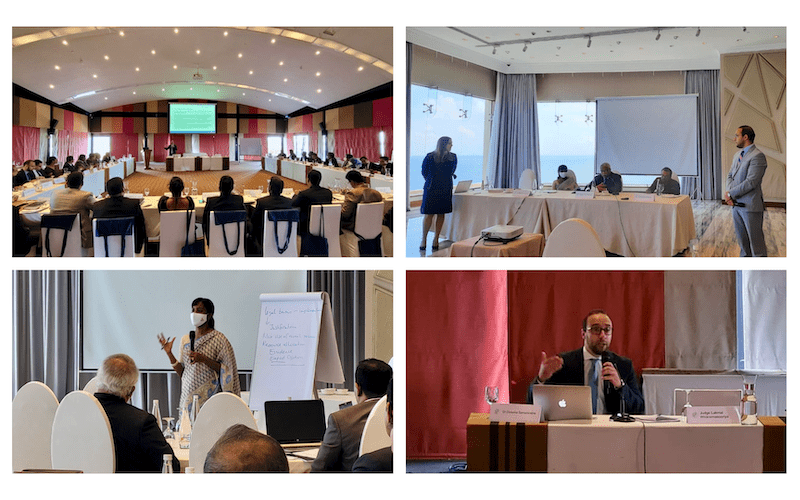The Foundation delivers Workshop on Economic, Social, and Cultural Rights in Galle and Dambulla in cooperation with the Judges’ Institute of Sri Lanka
The Max Planck Foundation held two consecutive workshops: the first on 17-18 September in Galle for judges in the southern province and the second on 24-25 September in Dambulla for judges from different provinces.
The first workshop in Galle was attended by 37 District, Magistrate, and High Courts Judges from the southern province. The workshop’s opening remarks were given by Justice L.T.B Dehidenya, Justice of the Supreme Court of Sri Lanka, and Member Board of Management of the Sri Lanka Judges’ Institute. The second workshop in Dambulla was attended by 36 District, Magistrate, and High Courts Judges from the different Sri Lankan provinces. The workshop commenced with an opening remark by Hon. Justice Janak De Silva, Justice of the Supreme Court of Sri Lanka , benefited from his interventions during the two-day program.
The first day of both workshops introduced participants to different types of legal reasoning, judicial interpretation, the concept of judicial policy, the judicial decision-making process in general and different techniques to improve the quality of judgments. This was followed by an introduction to Economic, Social, and Cultural Rights (ESCR) discussing specific features and peculiar traits of ESCR, focusing especially on their domestic application and the issue of justiciability. Afterwards the Foundation’s staff presented a session on comparative perspective to legal reasoning and judicial interpretation of ESCR, where the discussion of legal reasoning continued with providing further comparative jurisprudence on using the mentioned judicial techniques about the application of ESCR and raises the question of the possibility of citing foreign judgments in the domestic legal system. The first day of the two workshops was concluded by a session given by a local expert on the legal reasoning and judicial interpretation of ESCR in Sri Lanka from a practical perspective by discussing several case studies after participants were split into different groups and asking them to provide perceptions in light of various interpretation means that have been presented.
The second day of both workshops focused on Economic, Social, and Cultural Rights (ESCR) during times of crisis with reflections on the current situation in Sri Lanka. The first session covered the legal and conceptual framework relevant to ESCR during times of crisis, where it explored the application and possible limitations of ESCR in exceptional circumstances. It was followed by a practical exercise on ESCR during times of crisis by providing case studies from a comparative practice. The last session of the workshop was a panel discussion between the local experts and the representative of the Judges’ institute and moderated by the Foundation staff, who actively engaged the participants with questions and points of view on the application of ESCR during times of crisis.
The Judges expressed diverse views and engaged in a fruitful discussion of the ESCR at the international, national, and local levels, with a particular focus on cutting-edge issues that have come up in their daily work with analytical reflections on the current situation in Sri Lanka. Throughout the sessions, the Judges participated in case studies and reflected on innovative interpretative methods to strengthen human rights protections at the provincial level.
The workshops are the second and third of three workshops held in partnership with the Judges’ Institute of Sri Lanka at the provincial level as part of the German Federal Foreign Office-funded project, “Advancing Institutional Capacity in the Sri Lankan Justice System”.

